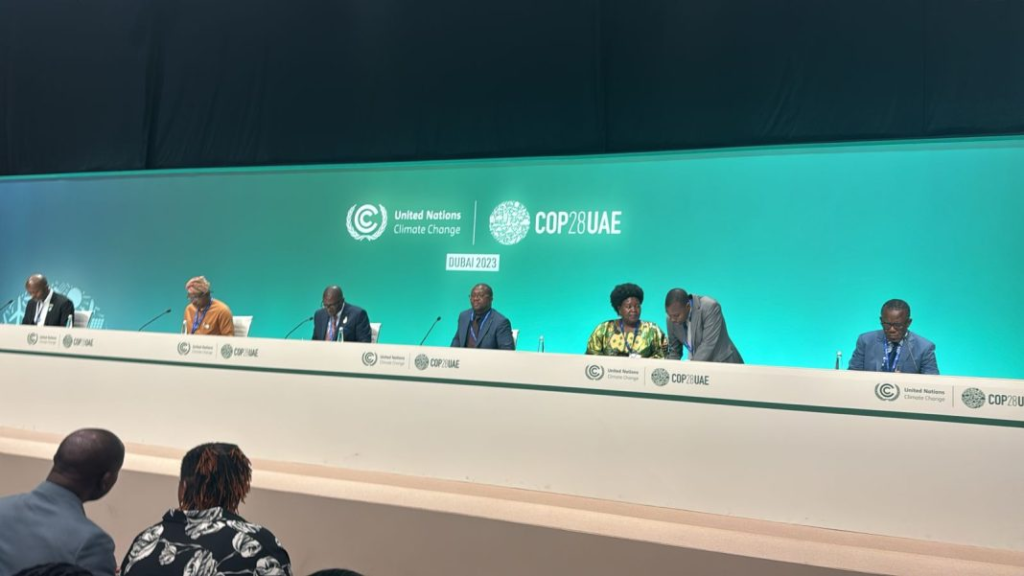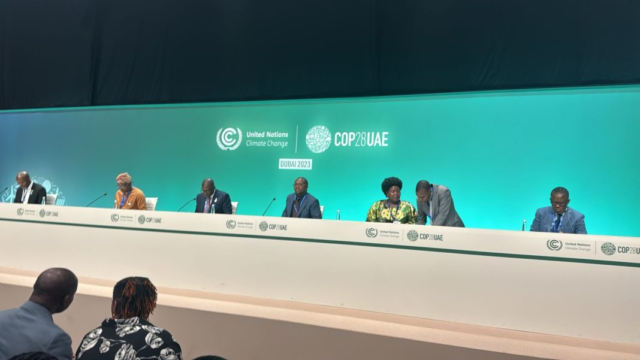
With the ongoing climate negotiations, an important update encapsulated in the African Group’s statement. Hon. Eng. Collins Nzovu, Minister of Green Economy and Environment of Zambia and Chair of the African Group of Negotiators on Climate Change, articulates Africa’s nuanced position on critical matters. From adaptation strategies to the Global Goal on Adaptation (GGA) and the profound impact of the Global Stock Take (GST), this statement unfolds the continent’s perspective with clarity. Below is the detailed Statement offering insights into Africa’s dynamic energy transition and the inherent challenges it confronts.
SECOND PRESS STATEMENT BY THE AFRICAN GROUP ON THE STATUS OF NEGOTIATIONS AT COP28
Dubai, United Arab Emirates, 11th December, 2023
Press Statement delivered by his Excellency, Hon. Eng. Collins Nzovu, MP, Minister of Green Economy and Environment of Zambia as Chair of the African Group of Negotiators on Climate Change (AGN)
Fellow Honourable Ministers Present;
Distinguished Delegates;
Members of the Press;
- The African Group wishes to make this statement on the status of negotiations so far and also indicate our expectations of the outcome as we have unambiguously demanded since the inception of the COP;
- Let me reiterate as we have indicated before that adaptation is a key issue for Africa, and an outcome on the Global Goal on Adaptation (GGA) has been our key demand. We will not agree on anything here unless Africa’s top priorities are met, which to us, is a GGA framework. If we are serious about saving lives, livelihoods and protecting ecosystems, then the GGA framework must have ambitious, time-bound targets with clear means of support for implementation;
- We cannot agree at COP-28 that the Global Goal on Adaptation (GGA) is low in ambition by having only process-based targets, this is about outcomes and it is about saving lives;
- The GGA outcome must address thematic targets and dimensional targets on equal footing and the targets must be measurable and time-bound so we can track progress. Tracking progress, which is outcome-based is important in reducing impacts and risks;
- We note the critical importance of the GGA in the GST, which must assess collective progress on implementation. It is therefore imperative that the GGA outcome must have strong language on the GST;
- Despite the strain on our budgets and the increasing burden of debt, our governments have committed significant domestic resources on adaptation. However, only scaled up, adequate and predictable international public finance can close the widening gap. Means of implementation is therefore the cornerstone for realising the GGA and its framework.
- Africa cannot accept a GGA framework without means of implementation from developed countries for developing countries, especially on the targets;
- We demand for a standing agenda item on GGA and further work on metrics and indicators for tracking progress, including inviting input from the IPCC at a workshop and a longer-term task force for adaptation beyond the GGA framework;
- On the Global Stock Take, the outcome must recognize Africa’s Sustainable Development and Poverty Eradication imperatives; that are consistent with Agenda 2063: The Africa We Want, if we are to successfully address our pressing developmental challenges and support global efforts to achieve the goals of the Paris Agreement;
- It must be understood that Africa will need to exploit its natural resources and renewable energy endowments to achieve universal access to energy as per SDG 9;
- The GST outcome must promote equity and fairness in the allocation of policy space, and ensure that the energy transition will be just, equitable and orderly, as such the transition should be premised on differentiated pathways to net zero and fossil-fuel phasedown;
- It should also recognize the full right for Africa to exploit its natural resources sustainably and in line with sustainable development and poverty eradication needs;
- Africa’s cumulative historical emissions are a paltry 3 percent of the global total; current emissions from the energy and industrialized sector are also an inconsequential 3 percent for a continent of over 50 countries and 1.5 billion people;
- Further to this, the continent is the least electrified, over 50% of the countries in Sub-Saharan Africa have electricity access rates below 50%, while 600 million people are without access to electricity which is central for the provision of basic services, including primary health, clean water, education and livelihoods;
- The Sixth Assessment Report of the Intergovernmental Panel on Climate Change (IPCC) has indicated that more than 900 million people in Africa are without clean cooking technology, many of whom are still using biomass and animal dung for cooking, resulting in many health problems particularly for women and children. Poverty eradication and access to modern energy is a priority for Africa;
- According to the United Nations Economic Commission for Africa (UNECA), an estimated $2 trillion in investments are needed in new generation, transmission and distribution infrastructure along with innovative energy technologies and delivery systems to meet the continent’s growing energy needs;
- The global stocktake outcomes should clarify a way of achieving our priorities, without pre-determining our policy options;
- Africa’s Energy Resources and Potential
- Africa holds 6 percent of known global reserves of oil and gas and accounts for about 12% of global production;
- According to Organisation for Economic Cooperation and Development (OECD), Africa is the second largest exporting region with 16% of total exports;
- Crude oil production in Africa is estimated at almost 10 million barrels per day, representing about 10% of global crude oil production according to The African Energy Commission (AFREC);
- These resources are crucial to Africa’s development as a means of earning foreign exchange and a positive balance of payments;
- Therefore, significant concessional financial support for our transition is essential, if we are to move away from the exploitation of fossil fuels;
- Many African countries are also developing national energy transition plans with a mixed energy portfolio that includes the use of natural gas as a transitional fuel while seeking to increase energy produced from renewable energy;
- The Climate Science on Energy
- The Sixth Assessment Report of the Intergovernmental Panel on Climate Change (IPCC)describes the multiple possible strategies to transform the energy system to reach net zero CO2 emissions and to limit likely warming to 2°C or below;
- The pathway that any country or region might follow will depends on a wide variety of factors, including, resource endowments, trade and integration with other countries and regions, carbon sequestration potential, public acceptability of various technologies, the nature of domestic industries, the degree of urbanization, and the relationship with other societal priorities such as energy access, energy security, air pollution, and economic competitiveness;
- Accordingly, African countries will pursue Sustainable development pathways (SDPs), aimed at attaining the Sustainable Development Goals (SDGs) in the short term and the goals of sustainable development in the long term;
- Let me be clear that Africa is in support of limiting warming to 1.5°C, however this should be based on differentiated pathways where African countries close the supply gap, rather than developed countries continuing to issue exploration licenses to avoid stranded assets as the African supply will be towards the global demand;
- The economic impact of stranded assets could amount to trillions of dollars. Fossil fuel assets are most vulnerable over the coming decade; oil and gas assets are more vulnerable toward mid-century.
I thank you for listening.
Issued and original copy Signed by:
Hon. Eng. Collins Nzovu, MP, Minister of Green Economy and Environment of Zambia, Chair of the African Group of Negotiators on Climate Change (AGN)






